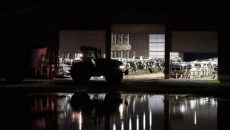VANCOUVER - The incoming leader of a group that represents surgeons across British Columbia is questioning the health minister's claims that nearly all surgeries that were cancelled in the first and later waves of the pandemic have been completed.
Dr. Cassandra Lane Dielwart, president-elect of the British Columbia Orthopaedic Association, said the province did not account for many patients who have suffered without "life-transforming" procedures that weren't even booked, forcing some to become addicted to painkillers.
Health Minister Adrian Dix told a recent news conference that 99.8 per cent of patients whose surgery was postponed in the first wave of the pandemic have had it, and that's the case for 94.2 per cent of those who did not get their procedure in the second and third waves.
About 15,000 surgeries in all categories were initially cancelled but most of them have now been done, Dix said in an interview Tuesday. Many were urgent procedures for cancer and heart patients, but those needing orthopedic surgeries like hip or knee replacements also had them, he said.
However, catching up on postponed surgeries has delayed others, leaving the province with a "significant hill to climb," he said.
"Reducing surgical wait times is a priority. And that's why I think B.C. has responded more vigorously, more dynamically, to the impacts of COVID-19. One, we built up the system to do it, and two, we took real action in May of 2020 to immediately start addressing what was going to be a significant backlog."
Dielwart, whose association speaks for about 170 surgeons, said she and other doctors have been getting fewer operating-room days due to a shortage of staff like nurses, so patients are not getting booked for surgeries.
That means they're not being counted on any list of cancelled procedures, she said.
Dix's claims that nearly all cancelled surgeries were completed did not fit the reality of an estimated 10,000 people waiting for surgery, many from the first wave of the pandemic, she said.
"With the stories coming in from around the province, there has not been a single surgeon whose wait-list has gone down. I have not spoken to anybody where their wait-list has stayed the same. It's incrementally increased."
The province needs to come up with standardized data to count unbooked procedures so there's a more realistic picture of how many people are waiting for surgery, Dielwart said.
She said orthopedic patients in British Columbia aren't considered a priority compared with heart and cancer surgeries, adding those showed a net reduction in wait times.
"That's a success story for those guys, but unfortunately for the orthopedic side is our patients who are suffering."
Many people have missed out on procedures that would have greatly improved their quality of life before they lost more mobility, she said.
Dielwart said she asked for an urgent meeting with Dix in a letter sent to his ministry on March 16 but has not had a response about working with the province and health authorities to ensure appropriate access to surgery for patients.
She said one surgeon in Prince George had a wait-list that averaged about 80 to 90 people for about five years before the pandemic. Now he has 271 people waiting for their turn in the operating room.
About 1,500 orthopedic patients are on wait-lists in Kamloops, while 1,200 people need surgery in Kelowna, with half of them now waiting over a year, Dielwart said.
Wait times for orthopedic surgery in Kelowna — where she performs orthopedic trauma surgery and joint replacements — were down to four to six months before the pandemic, she said.
The Health Ministry did not immediately respond to a question about whether it has a timeline for catching up with orthopedic surgeries that have yet to be completed.
Some patients start their visits to an orthopedic surgeon using a cane and taking Tylenol for pain, which often becomes less manageable without stronger medication, Dielwart said.
"A couple of months go by and all of a sudden they're using a walker and then they're in a wheelchair and then they can't actually get through their day, so they have to go on Tylenol 3s and then Tylenol 3s don't cut it so now they need oxycodone.
"Pain affects every second of their day. You wake up in pain, you think about how you're going to get to the kitchen to make breakfast," she said, adding some people fall into a deep depression.
Others have progressed to using a fentanyl patch after 17 months of waiting for surgery, Dielwart said.
Figures from the Canadian Institute for Health Information show that in the first wave of the pandemic, about half of Canadians who received a joint replacement did not get their surgery within recommended time frames, compared with around one-third in 2019.






